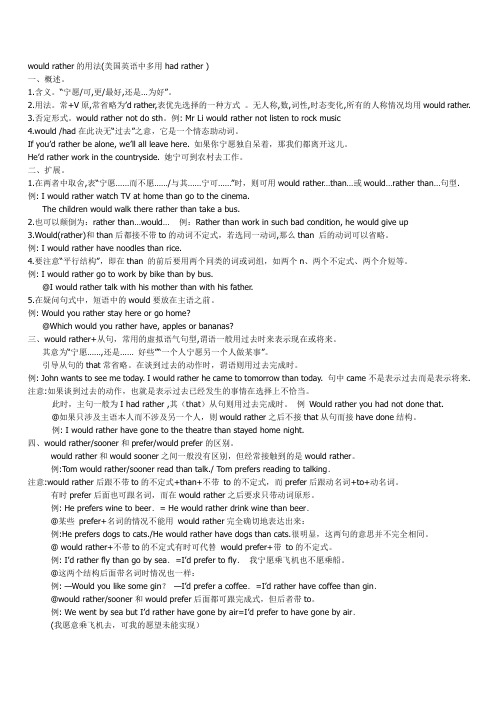prefer和would rather的用法区别
- 格式:doc
- 大小:39.00 KB
- 文档页数:5

wouldrather和preferto的用法总结"Would rather"和"prefer to"都是表达偏好或选择的短语,用于表示对两种或多种可能性中的一种更加喜欢或更愿意的情况。
尽管它们的意思相似,但使用方式和语法结构上存在一些细微差异。
"Would rather"是一个固定短语,用于表达人对于一种选择的偏好。
它的常见用法是"would rather" + 从句(虚拟语气)或"would rather"+ 动词原形。
下面是一些使用"would rather"的例句:- I would rather stay at home than go to the party.(与其去参加派对,我宁愿呆在家里。
)- They would rather play video games than do their homework.(他们宁愿玩电子游戏也不愿做家庭作业。
)而"prefer to"是一个动词短语,表示人更喜欢或更愿意选择其中的一种。
它的常见用法是"prefer to" + 动词原形,或"prefer to" + to + 动词原形。
以下是一些使用"prefer to"的例句:- I prefer to eat at home rather than eat out.(与其出去吃饭,我更喜欢在家里吃。
)- She prefers to read books instead of watching TV.(她更喜欢看书而不是看电视。
)- They prefer to travel by train to avoid traffic.(他们更喜欢乘火车旅行,以避免交通阻塞。
)虽然这两个短语的意思相似,但也有一些语法上的区别点:1. "Would rather"通常用于虚拟语气的情况下,以表达对于一个与现实情况相反或与目前情况不符的选择。

would rather的用法(美国英语中多用had rather )一、概述。
1.含义。
“宁愿/可,更/最好,还是…为好”。
2.用法。
常+V原,常省略为’d rather,表优先选择的一种方式。
无人称,数,词性,时态变化,所有的人称情况均用would rather.3.否定形式。
would rather not do sth。
例: Mr Li would rather not listen to rock music4.would /had在此决无“过去”之意,它是一个情态助动词。
If yo u’d rather be alone, we’ll all leave here. 如果你宁愿独自呆着,那我们都离开这儿。
He’d rather work in the countryside. 她宁可到农村去工作。
二、扩展。
1.在两者中取舍,表“宁愿……而不愿……/与其……宁可……”时,则可用would rather…than…或would…rather than…句型.I would rather watch TV at home than go to the cinema.The children would walk there rather than take a bus.2.也可以颠倒为:rather than…would…例:Rather than work in such bad condition, he would give up3.Would(rather)和than后都接不带to的动词不定式,若选同一动词,那么than 后的动词可以省略。
例: I would rather have noodles than rice.4.要注意“平行结构”,即在than 的前后要用两个同类的词或词组,如两个n、两个不定式、两个介短等。
例: I would rather go to work by bike than by bus.@I would rather talk with his mother than with his father.5.在疑问句式中,短语中的would要放在主语之前。


would rather的用法(美国英语中多用had rather )一、概述。
1.含义。
“宁愿/可,更/最好,还是…为好”。
2.用法。
常+V原,常省略为’d rather,表优先选择的一种方式。
无人称,数,词性,时态变化,所有的人称情况均用would rather.3.否定形式。
would rather not do sth。
例: Mr Li would rather not listen to rock music4.would /had在此决无“过去”之意,它是一个情态助动词。
If yo u’d rather be alone, we’ll all leave here. 如果你宁愿独自呆着,那我们都离开这儿。
He’d rather work in the countryside. 她宁可到农村去工作。
二、扩展。
1.在两者中取舍,表“宁愿……而不愿……/与其……宁可……”时,则可用would rather…than…或would…rather than…句型. 例: I would rather watch TV at home than go to the cinema.The children would walk there rather than take a bus.2.也可以颠倒为:rather than…would…例:Rather than work in such bad condition, he would give up3.Would(rather)和than后都接不带to的动词不定式,若选同一动词,那么than 后的动词可以省略。
例: I would rather have noodles than rice.4.要注意“平行结构”,即在than 的前后要用两个同类的词或词组,如两个n、两个不定式、两个介短等。
例: I would rather go to work by bike than by bus.@I would rather talk with his mother than with his father.5.在疑问句式中,短语中的would要放在主语之前。

would rather的否定用法Would rather这个表达方式,表示在两种选择中更偏向于哪一种。
即“宁愿”、“更喜欢”。
那么如果我们要表示否定的 would rather,该怎么表达呢?一、Would rather 的否定表达Would rather 通常使用缩略形式,即“‘d rather”. 要表示 would rather 的否定形式,可以加上 not,形成wouldn’t rather 或would rather not.例如:I wouldn’t rather go to the party tonight. (我不想去参加今晚的派对)I would rather not eat sushi.(我不想吃寿司)二、Would rather 的问句表达1. Would you rather not go to the party tonight?你今晚不想去参加派对吗?2. Don’t you ‘d rather study at home today?今天你不想在家学习吗?三、Would rather 和 would prefer 的区别Would rather 和 would prefer 的用法很类似,但它们两个同时存在于一种语言中,所以必须懂得他们之间的区别。
Would prefer 表示的是两个或多个事物中较喜欢或偏爱的那一个,而would rather 表示的是在两种选择之间选一种,而另一种则比较低人一等、没那么好。
例如:I would prefer tea to coffee.(我喜欢茶胜过咖啡)I would rather stay at home than go to the cinema.(我宁愿呆在家里,也不想去电影院)总之,would rather 的否定形式is wouldn’t rather 或 would rather not. 而 would prefer 则表示“更喜欢、更偏爱”一种选择,两者的用法应按照特定的语境来使用。

prefer和would rather的用法区别一、prefer to do sth= would rather do sth更喜欢做某事,宁愿做某事。
例如: I’d like to stay at home , but Max prefers toplay(play) football on Sundays.= I’d like to stay at home ,but Max would ratherplay(play) football on Sundays.注意点:1. prefer to do sth 不仅有人称变换,第三人称形式是prefers to do sth , 而且还有时态变化, 过去时态为preferred to do sth。
2. would rather既无人称变化,也无时态变化。
二、prefer to do sth rather than do sth=prefer doing sth to(doing) sth =would rather do sth than do sth 即prefer A to B, “比起B来更喜欢A”,其中to是介词。
例如:All students prefer to take the bus rather than walk.= All students prefer taking the bus to walking.=All students would rather take the bus than walk.【考点回放】1. Not all the tourists from Japan_______ Western food to Chinese food. (2007年无锡市)A. likeB. preferC. enjoyD. love解析:这道题的考点是prefer A to B 的结构,其中A 和B可以是名词、代词,或是动名词,所以答案是B。
would rather与prefer用法解析作者:卓小丽来源:《考试·中考版》2011年第09期Would rather与 prefer的用法是牛津英语9A Unit 2语法的重点,也是中考考点之一,下面针对初中阶段的常见用法作简单解析:(一) would rather没有人称与时态的变化。
1. would rather do sth. 宁愿做某事,更喜欢做某事,它的否定形式为:would rather not do sth.例如I would rather stay at home.它的否定句为:I would rather not stay at home.2. would rather do A than do B.宁愿做A也不愿意做B(或比起B更喜欢A)。
例如She would rather go shopping than see a film.比起看电影,她更喜欢去购物。
(二) prefer to do sth. 不仅有人称变化还有时态变化。
它的第三人称变化形式是prefers to do sth.,它的过去时形式为preferredto do sth.。
1. prefer to do sth. = would rather do sth. 宁愿做某事,更喜欢做某事例如I would rather stay at home.= I prefer to stay at home.2. prefer doing A to doing B(to为介词)= would rather do A than do B宁愿做A也不愿意做B(或比起B更喜欢A)例如She would rather go shopping than see a film.=She prefers going shopping to seeing a film.3. prefer A to B比起A更喜欢B(A和B可以是名词、代词或者动名词)例如Most girls prefer pink to black.(三) prefer doing A to doing B= would rather do A than do B=prefer to do A rather than do B(than后面用动词原形)宁愿做A也不愿意做B(或比起B更喜欢A)例如She would rather go shopping than see a film.=She prefers going shopping to seeing a film.=She prefers to go shopping rather than see a film.【中考链接】1.(2009年南通市)—Does your brother like going hiking on Sundays?—No, he would rather read books at home than _____ hiking.A. goB. goingC. to goD. goes解析本题的考点是would rather do A than do B, than后需要用动词原形,所以应该选A。
preferto与wouldrather用法辨析作者:陈章英来源:《初中生世界(初三年级)》2008年第10期【要点精讲】一、prefer to do sth= would rather do sth更喜欢做某事,宁愿做某事。
例如: I’d like to stay at home , but Max prefers toplay(play) football on Sundays.= I’d like to stay at home , but Max would ratherplay(play) football on Sundays.注意点:1. prefer to do sth 不仅有人称变换,第三人称形式是prefers to do sth , 而且还有时态变化, 过去时态为preferred to do sth。
2. would rather既无人称变化,也无时态变化。
二、prefer to do sth rather than do sth=prefer doing sth to(doing) sth =would rather do sth than do sth 即prefer A to B, “比起B来更喜欢A”,其中to是介词。
例如:All students prefer to take the bus rather than walk.= All students prefer taking the bus to walking.=All students would rather take the bus than walk.【考点回放】1. Not all the tourists from Japan_______ Western food to Chinese food. (2007年无锡市)A. likeB. preferC. enjoyD. love解析:这道题的考点是prefer A to B 的结构,其中A 和B可以是名词、代词,或是动名词,所以答案是B。
Prefer, would like ,would rather 的用法一、词组prefer to的用法及物动词prefer相当于like sth. better, 意思是“宁愿; 较喜欢”, 现在分词、过去式要双写-r,再加-ing, -ed,即preferring, preferred, preferred。
1.prefer + n. / pron. / doing / sth. 喜欢某人或某物; 宁愿做某事Mr. Brown preferred spending his spare time doing some reading.布朗先生比较喜欢把业余时间用来读点书He comes from Shanghai, so he prefers rice. 他是上海人,因此更喜欢吃米饭。
I prefer going by bike.我宁愿骑单车去。
So you prefer speaking without referring to your notes? 这么说,你更喜欢不看稿子做报告了.2.prefer A to B “宁愿做...而不做...”. He prefers English to Chinese. 比起汉语他更喜欢英语。
prefer doing A to doing BEven on holidays Mr. Wang preferred reading to doing nothing.即使在假日,王先生宁愿读书而不愿闲着。
注:在这种结构中,to为介词,而不是不定式符号,故其后应当接动名词形式,决不能接动词原形。
3.prefer to do sth. “愿意做”。
I prefer to go at once.我愿意马上就走4.prefer sb. to do sth. 宁愿某人做某事I prefer you to spare some time to come to our art exhibition next week. 我宁愿你们下星期抽出点时间来看看我们的美展。
矿产资源开发利用方案编写内容要求及审查大纲
矿产资源开发利用方案编写内容要求及《矿产资源开发利用方案》审查大纲一、概述
㈠矿区位置、隶属关系和企业性质。
如为改扩建矿山, 应说明矿山现状、
特点及存在的主要问题。
㈡编制依据
(1简述项目前期工作进展情况及与有关方面对项目的意向性协议情况。
(2 列出开发利用方案编制所依据的主要基础性资料的名称。
如经储量管理部门认定的矿区地质勘探报告、选矿试验报告、加工利用试验报告、工程地质初评资料、矿区水文资料和供水资料等。
对改、扩建矿山应有生产实际资料, 如矿山总平面现状图、矿床开拓系统图、采场现状图和主要采选设备清单等。
二、矿产品需求现状和预测
㈠该矿产在国内需求情况和市场供应情况
1、矿产品现状及加工利用趋向。
2、国内近、远期的需求量及主要销向预测。
㈡产品价格分析
1、国内矿产品价格现状。
2、矿产品价格稳定性及变化趋势。
三、矿产资源概况
㈠矿区总体概况
1、矿区总体规划情况。
2、矿区矿产资源概况。
3、该设计与矿区总体开发的关系。
㈡该设计项目的资源概况
1、矿床地质及构造特征。
2、矿床开采技术条件及水文地质条件。